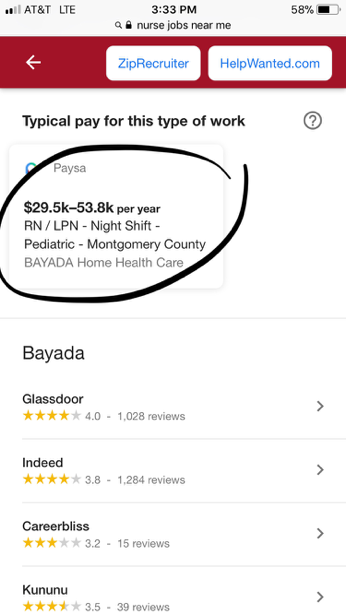Back in June, Google went live with its job search tool. People have been talking about it for months now, and the buzz isn’t dying down anytime soon. I’ve been sitting back waiting to see how things play out, including updates to the first version of the tool.
In fact, Google just pushed out a few new features last week. One of the most valuable feature updates provides job-seekers with information on pay ranges for posted positions.
For job postings missing pay ranges (a good majority of them), Google will scrape in data from other sources like Glassdoor, Payscale, and other places. In turn, candidates won’t have to go digging elsewhere for this data.
 I did a simple search in Google for “nurse jobs near me,” and here’s what I found (shown).
I did a simple search in Google for “nurse jobs near me,” and here’s what I found (shown).
This updated feature from Google Jobs is a welcome one for many job-seekers.
Candidates have been forced to provide current and desired compensation on applications for years … though asking candidates the “salary question” about their current pay is becoming illegal in many area. What sorts of standards should apply to employers?
Although there are pros and cons to companies including pay ranges in job postings, it could be something to consider so accurate information is provided in Google Jobs listings.
Here are the pros:
It will enable you to attract more candidates
According to research from CareerBuilder, job postings that include salary information perform better than those without it. Some candidates won’t even apply to a job posting unless this information is available, so failing to include at least a pay range may be causing you to lose out on potential talent.
It shows transparency
Transparency provides candidates a glimpse into a company’s culture, including how it treats employees. Providing this information can also be extremely helpful to creating an overall positive employer brand in the eyes of your candidates — even if the pay range doesn’t fit what they’re looking for.
You will save time in the process
Companies can avoid questions in the process by providing pay range information to candidates up front. I’ve found that nothing hurts worse than reaching out to an amazing candidate only to find out that the pay they are seeking is outside what your company is willing to provide for the position. Point blank, providing this information up front can help you eliminate candidates that exceed your pay range.
You can find out what’s attracting the right talent
For companies who aren’t quite sure what pay range they should be targeting for the caliber of candidates they are seeking, providing this information in a job posting can help to determine if the right talent is attracted. If the pay range is attracting under-qualified candidates, you have the ability to tweak the posting to reflect a higher range.
Here are the cons:
You could end up limiting your talent pool
Companies who aren’t quite sure about what they are willing to pay for a position could eliminate potentially qualified candidates by putting down the wrong range in the job posting. If it’s too low, but you’re willing to pay more for the right candidate, it’s important to include a confident range.
Your competition could use this information as intel
If your competition knows the pay range you are targeting for new talent, they could try to make their compensation and benefits a little sweeter than yours. This could also help your competitors take talented employees from your company.
If you give the wrong range, you may find yourself in the same place
Candidates who see a pay range on a job posting are going to automatically assume they are more qualified to receive the upper part of the range. At the same time, you may have been able to find the right person for the job at a lesser salary than the range you provided. If you provide too wide of a range, you may be setting yourself up for disappointment when it comes time to make an offer to the right candidate.
You may not be able to illustrate your full offering
If the target pay range isn’t competitive in your market, it can be difficult to illustrate your total compensation package to potential candidates. You’ll then be forced to decide on including the pay range with bonus and other incentives factored in, setting false expectations for some. On the flip side, you may leave off total compensation and include just the base salary range, hoping candidates will read your job posting further to see the silver lining.
What do you think about this Google Jobs update? Do you think it will help candidates and organizations with finding the right talent?